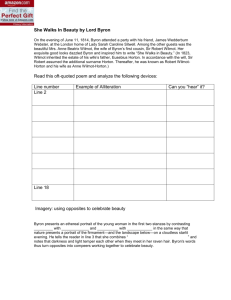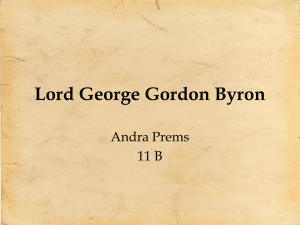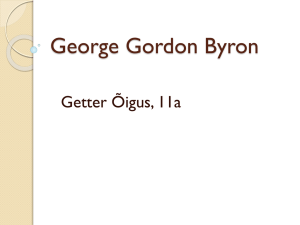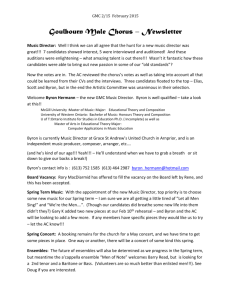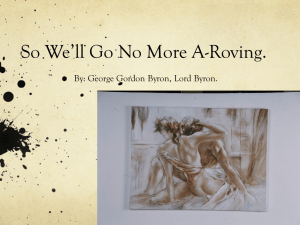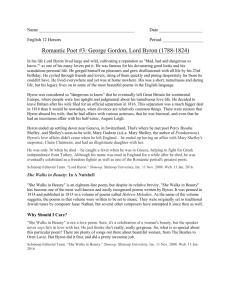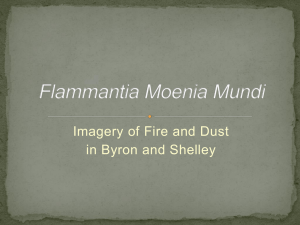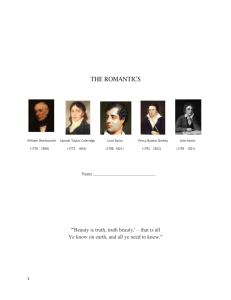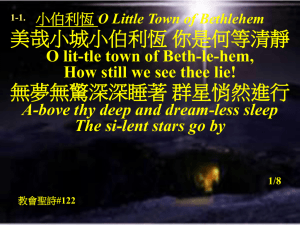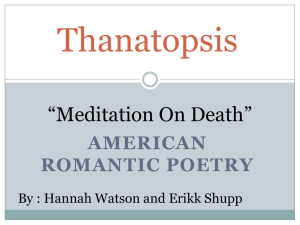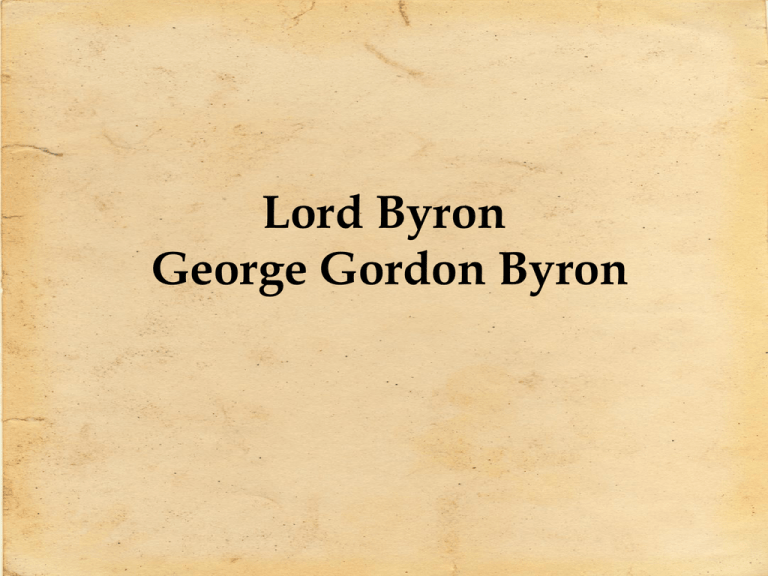
Lord Byron
George Gordon Byron
George Gordon Byron
• 1788-1824
• George Gordon Byron
simply known as Lord
Byron
• Leading figure in
Romanticism
• Born with a club-foot
which caused him much
humiliation
• Inherited his greatuncle’s title at the age of
10
Early Life
• Attended Cambridge University
• Had romances with several women, many
of them married
• Many bisexual love affairs and debts
• Rumors of incest with his half-sister
Augusta Leigh, from whom he had a baby
Interesting Facts
• It was alleged he had sex with over 250
women over the course of a year while in
Venice.
• He fell in love with a man named John
Edleston while at school.
• He fell ill a few days before he planned to
attack a Turkish Fortress. He died before
he could attack the Fortress.
• He was born with a club foot and became
extremely sensitive about his lameness.
More Interesting Facts
• He owned a bear, fox, monkeys, parrot,
eagle, crocodile, falcon, peacock, badger,
and his favorite his Newfoundland dog
named Boatswain.
• He was accused of having sex with
animals but it was never proven.
• He changed his name on more than one
occasion.
• He had many affairs throughout his entire
life.
• Left England in 1816, never to return
– Affair with Shelley’s half sister Claire
• He died in Greece of a fever on 19 April
1824.
– He had gone to fight for Political freedom
against Ottoman Empire. He died as a hero
in their minds
Childe Harold's Pilgrimage
• lengthy narrative poem It was published between 1812 and 1818.
– the travels and reflections of a world-weary young man disillusioned
with a life of pleasure and revelry, looks for distraction in foreign lands;
– an expression of the melancholy and disillusionment felt by a generation
weary of the wars of the post-Revolutionary and Napoleonic eras.
– The title comes from the term childe, a medieval title for a candidate for
knighthood.
• The poem contains elements thought to be autobiographical. Byron
traveled through the Mediterranean and Aegean Sea between 1809
and 1811[1].
– Byron's personal distaste for the poem: he felt it revealed too much of
himself,
– brought him a large amount of public attention. Byron stated that he
woke up one day and "found myself famous."
• The work provided the first example of the Byronic hero
• The poem has four cantos written in Spenserian stanzas, which
consists of eight iambic pentameter lines followed by one
alexandrine (a twelve syllable iambic line), and has rhyme pattern
ABABBCBCC.
Don Juan
• Satiric poem based on the legend of Don Juan
• Portraying Juan not as a womanizer but as
someone easily seduced by women
• Byron’s masterpiece
• Social, political, literary, ideological levels
• Two first cantos were published anonymously
• He completed 16 cantos, leaving the 17th
unfinished
Byronic hero.
• A distaste for social institutions and norms
• An exile, an outcast, or an outlaw, a troubled past
• Arrogant, Cynical, Disrespectful of rank and privilege
• Cunning and ability to adapt, Struggles with integrity
• “Dark” attributes not normally associated with a hero
• Emotionally conflicted, bipolar tendencies, or moodiness
• High level of intelligence and perception
• Mysterious, magnetic, and charismatic
• Powers of seduction and attraction lead to social and
sexual dominance
• Self-destructive behavior, Self-critical and introspective
• Sophisticated and well-educated
“SHE WALKS IN
BEAUTY”
SHE walks in beauty, like the night
Of cloudless climes and starry skies;
And all that 's best of dark and bright
Meet in her aspect and her eyes:
Thus mellow'd to that tender light
5
Which heaven to gaudy day denies.
One shade the more, one ray the less,
Had half impair'd the nameless grace
Which waves in every raven tress,
Or softly lightens o'er her face; 10
Where thoughts serenely sweet express
How pure, how dear their dwelling-place.
And on that cheek, and o'er that brow,
So soft, so calm, yet eloquent,
The smiles that win, the tints that glow, 15
But tell of days in goodness spent,
A mind at peace with all below,
A heart whose love is innocent!
She Walks in Beauty 1814 by
Lord Byron.
• not necessarily a love poem, but a
celebration of the subject's beauty.
• Wrote this poem about his wife Harriet’s
cousin
– He met her at a funeral. (hence the allusions
to darkness, with the light referring to her
beauty)
– he was taken aback. Nowhere in the poem
does Byron mention or allude to love.
When We Two Parted
by George Gordon Byron
When we two parted
In silence and tears,
Half broken-hearted
To sever for years,
Pale grew thy cheek and cold,
Colder thy kiss;
Truly that hour foretold
Sorrow to this.
The dew of the morning
Sunk chill on my brow-It felt like the warning
Of what I feel now.
Thy vows are all broken,
And light is thy fame;
I hear thy name spoken,
And share in its shame.
They name thee before me,
A knell to mine ear;
A shudder comes o'er me-Why wert thou so dear?
They know not I knew thee,
Who knew thee too well-Long, long shall I rue thee,
Too deeply to tell.
In secret we met-In silence I grieve,
That thy heart could forget,
Thy spirit deceive.
If I should meet thee
After long years,
How should I greet thee?-With silence and tears.
“Always laugh when you can. It
is cheap medicine.”
- Lord Byron

